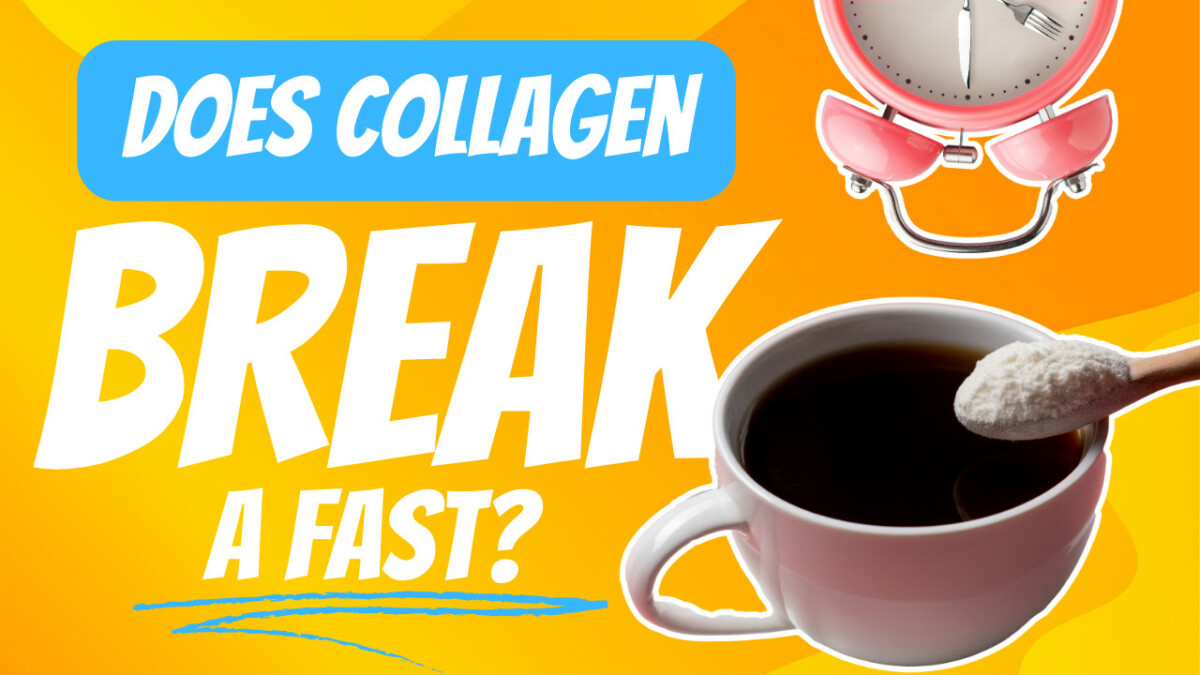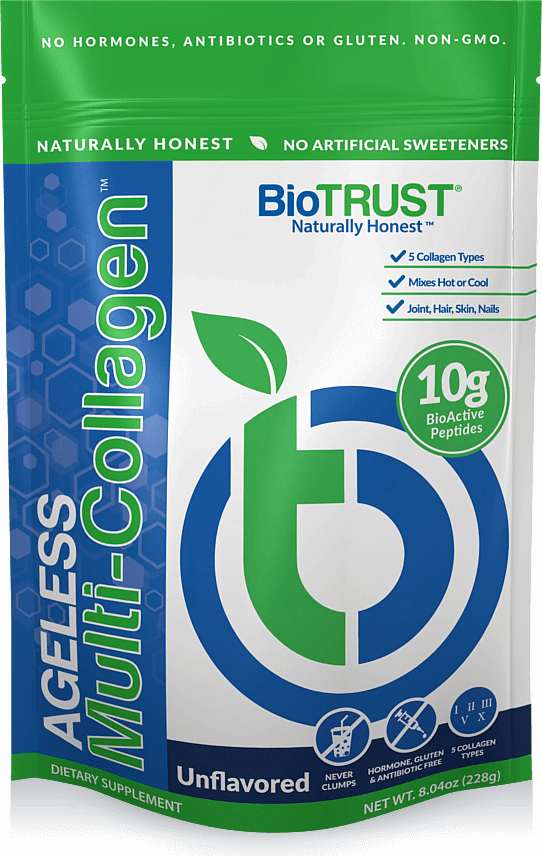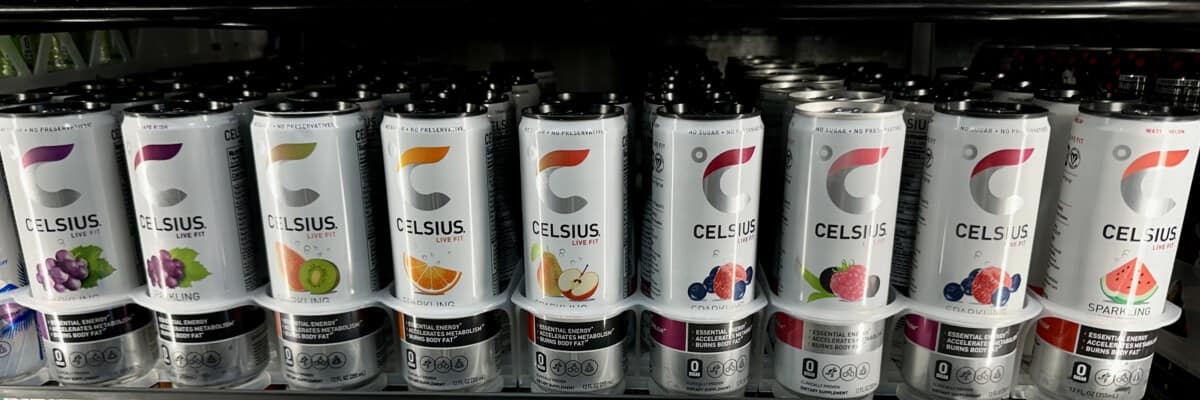Did you know that taking collagen during your fasting period will break the fast…
Intermittent fasting has become quite popular for its health benefits and simple approach to weight loss. But knowing exactly what you can and can’t have during your fasting period can also be confusing.
Collagen peptides have been found to be quite effective in improving skin, hair, nails, joints, and gut health. Yet taking collagen during your fasting window isn’t a great idea.
If you’ve been mixing collagen peptides into your morning coffee, then you may want to stop. You could be breaking your fast and reducing your intermittent fasting results.
Is It Okay to Take Collagen While Fasting?
Quick Answer:
Collagen contains protein and calories. Yes, taking collagen during your fasting window will break a fast. But if you’re following a less strict modified fasting routine, you could have some unflavored collagen powder.
Unflavored pure collagen peptides can contain 30-40 calories per serving. If you’re following a pure fasting routine, then the collagen supplement will break your fast.
Collagen is a protein that also causes insulin secretion in your body.1 The big goal of intermittent fasting is to keep your insulin as low as possible. By taking collagen during your fast, you’ll interfere with your fasting and reduce its effectiveness. The insulin secretion from protein is less than sugars or carbs, but not as low as dietary fats.
But intermittent fasting doesn’t always work like an on/off light switch. There is a gray area too. Dr. Jason Fung advocates a “50-calorie rule” that allows a very small amount of calories when fasting.
If having a small dollop of cream in your morning coffee makes it so you can keep fasting for longer, then it’s worth it, even though it could take away some of the early results.
If you really want to take collagen during your fasting window, be sure to limit it to a single serving of unflavored collagen peptides. But it’ll be best to take it during your feeding window instead.
Why Adding Collagen to Coffee Is a Bad Idea
Now that you know it can break your fast, adding collagen powder to your coffee when intermittent fasting… it’s also best not to mix collagen in your coffee at all.
When you place collagen into hot coffee, the collagen can become denatured and break down. Collagen begins to break apart at temperatures higher than your body temperature.
Adding collagen powder to hot coffee can cause its molecular structure to melt and reduce its bioavailability.
This will drastically reduce its effectiveness and health benefits. If you’re set on drinking your coffee with collagen, then I wouldn’t recommend it be anything hotter than lukewarm and definitely not scalding hot.
If the collagen coffee gets cold, don’t heat it back up in the microwave. The heat and irradiation from the microwave can cause the collagen to denature, which will also reduce its effectiveness.
When to Take Collagen if Fasting
You can take collagen on an empty stomach since it shouldn’t cause intestinal distress. The collagen peptides are pre-broken down into the powder supplement, making them much easier for your body to digest and absorb.
Collagen is easy on the stomach, and it’s rare to hear of someone having digestive issues with it. Taking collagen supplements can actually improve your gut health by rebuilding the intestinal lining.
I prefer taking collagen supplements mixed with a low-carb protein shake. Since collagen is a protein, combining it with protein powder makes it easier to reach your daily protein intake requirements.
You can take collagen in the afternoon or night when most people have their feeding window. I prefer taking collagen in the late afternoon or evening since your body does most of its recovery when you’re sleeping.
Taking collagen later in the day can boost its effectiveness. Your body can utilize it during sleep when it grows and repairs its tissue.
You can, and it’s recommended that you take collagen every day. Since collagen production depletes with time, it’ll be most beneficial for you to take it continually.2 But you can also take breaks from using collagen daily without worrying that your hair will fall out. It takes time for collagen to deplete again.
Does Collagen Break Ketosis
Most people are intermittent fasting to lose weight. Intermittent fasting causes the body to lose weight primarily by placing it in a state of ketosis.
Ketosis is when your body flips the metal box switch and starts using your fat stores for fuel. It does this by converting fat stores into ketones, which are then used as an energy source. This results in more stubborn fat and weight loss.
To first get into ketosis, you have to deprive your body of sugars and carbohydrates for many hours. Daily intermittent fasting gradually puts you in a light state of ketosis, which helps you lose weight. This is another reason you don’t want anything that can spike your insulin during your fast.
While collagen contains a few calories and protein, it doesn’t contain sugars or carbs if unflavored. Consuming collagen releases insulin, but it shouldn’t shut down ketosis since a single serving isn’t enough.
But you have to check the supplement fact label on your collagen powder too. Make sure that it doesn’t contain any added sugars, fillers, or other ingredients that could spike insulin.
With daily intermittent fasting, you may be able to activate a higher level of ketosis by taking MCTs. MCTs are converted into ketones and could help trigger the “metabolic switch” to start burning fat stores for energy. C8-MCTs are the most ketogenic type of MCTs, and you can read more in my Keto Elevate review.
Does Collagen Stop Autophagy
Another significant health benefit of intermittent fasting is autophagy. Autophagy is your body’s natural recycling process, where it clears out old damaged cells that could cause age-related health issues.
AMPK is like the energy manager for your body cells. It has a crucial role in autophagy and intermittent fasting. As your cells become low on energy due to fasting, AMPK is activated to make more cellular energy, which helps trigger the autophagy effect.
Autophagy from fasting really peaks 24 to 48 hours after starting the fast. But you still get some of the autophagy in a reduced effect in a shorter fasting window. The trick with maximizing autophagy when fasting is not to consume anything that will break your fast.
Anything that spikes your insulin, like sugars and carbs, will shut down autophagy. This goes for proteins and amino acids as well. Since collagen is technically a protein, it’ll stop autophagy cold in its tracks.
Interestingly, amino acids don’t really cause blood glucose levels to spike, but insulin does. So, if your goal with intermittent fasting is autophagy to get rid of damaged cells, then you don’t want to be consuming collagen.
What Happens to Your Body When You Take Collagen Every Day
Taking collagen daily can help reverse many signs of aging in your tissues by improving the quality of:
- hair
- nails
- skin
- joints
- gut
Since collagen production depletes over time, it’s ideal to take it daily to recover this lost collagen in your body.
However, since collagen is a protein that contains amino acids, it’ll raise insulin in the body. The goal of fasting is to keep insulin as low as possible, so consuming collagen peptides during your fasting window will break the fast.
Using a collagen powder supplement in combination with intermittent fasting can help indirectly with weight loss. I recommend and prefer mixing collagen peptides into a low-carb protein shake. This not only helps to mask some of the flavor and smell of the collagen powder but also works as a healthy meal replacement that promotes weight loss.
Intermittent fasting works best in combination with a low-carb diet to maximize the ketogenic effect.
It’s best to limit your meals during your feeding window to only two or three per day. One meal to break your fast and another for dinner. Having a low-carb protein shake mix with collagen peptides as a snack between meals works best. This helps make it easier to also reach your daily protein intake needs.
There really isn’t a downside to taking collagen since it’s a natural part of your body that degrades with time. I would only be concerned with the quality of the collagen supplement you’re using. Some collagen supplements contain low quality peptides and have sugars, artificial sweeteners or fillers added.
Make sure the collagen peptides you use are in hydrolyzed peptide form. This form of collagen is pre-broken down, making it easier to digest and absorb. The best collagen powders will contain multiple types of collagen, 3-5+ different types, to maximize the benefits. Ideally, the collagen powder will be unflavored and have minimal added ingredients.
Contains 5 of the key types of collagen in scientifically ideal forms. Uses hydrolyzed collagne peptides making it easier to digest. Mixes easily, no clumping, with no odor or taste.
- Supports healthy, youthful looking skin & skin elasticity
- Supports joint health & comfort
- Supports hair health & growth
- Supports healthy body composition
Summary
So, does collagen break a fast? Yep.
The good thing about collagen is that it’s best to take it later in the day or in the evening instead of in the morning with your coffee. Coffee, when too hot, can denature the molecular structure of collagen, reducing its desired health benefits.
Collagen shouldn’t break ketosis when fasting because it contains no sugar or carbohydrates. But, it will break autophagy since the protein and amino acids can still cause an insulin increase in the body.
Big Tip:
A tip is to take some NAC with collagen. NAC is a potent antioxidant and supplement form of cysteine (one of the amino acids). Collagen naturally contains glycine and, when combined with NAC, is converted into glutathione, which is your body’s master antioxidant.
But if you’re following a less strict form of intermittent fasting, then you could technically have a small serving of unflavored collagen since it’s usually under the 50-calorie rule. But it’s best to take collagen supplements later in the day anyway to maximize their benefits and results.
Josh holds a Bachelor’s degree in Exercise Physiology and Nutrition Science. He’s a Certified Strength and Conditioning Specialist (CSCS) by the National Strength and Conditioning Association and he’s a Certified Personal Trainer (CPT) by American Council on Exercise. He’s worked as a Strength and Conditioning Coach at the high school and college levels. He has over 15 years of experience as a personal trainer and nutrition coach. He strives to bring inspiration and results for people to live healthier lives through smart diet and exercise.





